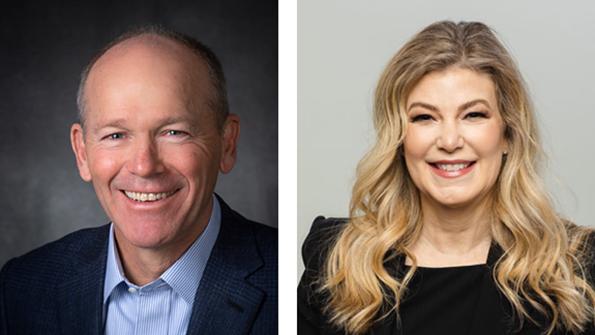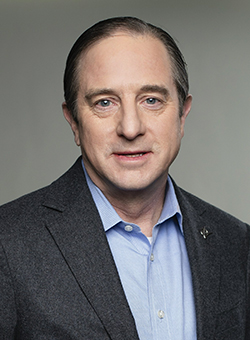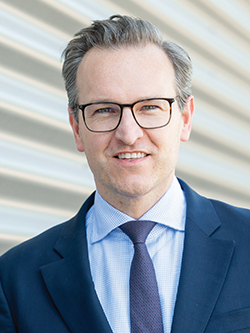
David L. Calhoun and Stephanie Pope
The last time Boeing named a chief operating officer was in December 2013, when then-CEO Jim McNerney elevated then-defense chief Dennis Muilenburg to run the sprawling aerospace and defense giant’s operations. The rest is history, but this time Boeing aims not to repeat it.
Boeing is promoting Stephanie Pope to become chief operating officer (COO) as of Jan. 1, a move that catapults the veteran Boeing leader onto the short list of potential CEOs. It also puts her in the spotlight to fix a behemoth that has continued to suffer operational setbacks and red ink amid growing investor expectations for payouts.
- Promotion finalizes a new short list of CEO candidates
- New leaders for Global Services unit and sustainability
Pope’s promotion—announced on Dec. 11—will place her at the pinnacle of operational leadership and make her responsible for company-wide supply chain, quality, manufacturing and engineering, Boeing says. The heads of Boeing’s three divisions—commercial, defense and services—will report to her, as will the Boeing chief engineer and head of Boeing Global. In turn, Pope will report to Boeing CEO and President David Calhoun, as will other senior corporate functional leaders.
“The newly created position of COO creates a unique leadership transition plan for Boeing,” say financial analysts at Jefferies in response to the announcement. Pope’s appointment marks a more defined plan that puts a potential CEO in front of investors, customers and stakeholders ahead of an official transition.
“Next year will be a significant transitional year in our performance as we continue to restore our operational and financial strength,” Calhoun says in the announcement, “and Stephanie will help drive the stability and predictability necessary to ensure we deliver on our customer, employee, regulatory, investor and other stakeholder commitments.”
COOs are returning to prominence across aerospace and defense companies as industry labors to recover from the COVID-19 production disruption. Boeing, meanwhile, also suffered the 737 MAX grounding and production halt and 787 manufacturing problems. Its Defense, Space and Security division has kept burning cash long beyond expectations. For his part, Muilenburg was fired in December 2019 following the 737 MAX debacle.
While some companies incorporate COO duties in the role of the president—as Boeing does with Calhoun, who appears to be retaining the president title—the company explicitly is breaking out operational responsibility for Pope in reopening the COO position.

Calhoun, who is 66, does not have to retire until he turns 70 in April 2028, under conditions changed by the board of directors in April 2021. In February 2023, the board awarded Calhoun a roughly $5 million incentive package via 25,000 restricted stock units (RSU) to retain him. The RSUs vest in two installments after one and two years, according to Jefferies.
“We view the announcement positively, given Stephanie’s recent track record at Boeing,” the analysts tell investor clients.
Pope has been with Boeing for nearly three decades, with leadership positions at all three current divisions plus corporate functions such as investor relations. But she became more widely known among the investor community when she started taking turns as chief financial officer of each division, beginning in 2011.
Then in April 2022, Pope was appointed chief executive of Boeing Global Services (BGS), the company’s smallest yet best-performing division. It focuses on maintenance, repair and overhaul, which has been outshining manufacturing during the business recovery.
Pope’s appointment is just the latest of many changes Calhoun and the board are making to Boeing’s top echelon, including the departure of Marc Allen as strategy head, closure of his office and laying off of more headquarters-level personnel. Strategy now will be handled at the division level, Calhoun told employees. Allen, who is to leave at the end of 2023, was once seen as a potential CEO candidate, albeit a more distant one.
Indeed, the new short list of potential successors—which beyond Pope reportedly includes corporate current Chief Financial Officer Brian West and Boeing Commercial Airplanes CEO Stan Deal—essentially is the first under Calhoun. It comes a few years after he solidified his leadership amid a shakeup of earlier candidates. That included the recent departures of then-Boeing defense chief Leanne Caret and then-Chief Financial Officer Gregory Smith.
Boeing is expected to provide fourth-quarter and full-year 2023 financial results starting in late January, when it traditionally hosts a teleconference with analysts. They will press Calhoun and West—and possibly Pope—for as much financial and operational guidance for 2024 as possible, especially for expected free cash flow and airliner deliveries. For 2023, Wall Street is expecting at least $3 billion and 375 MAX deliveries.
Succeeding Pope as head of BGS, Chris Raymond will take on executive leadership of the division starting Jan. 1. He has been Boeing’s chief sustainability officer since October 2020 and was vice president for sustainability, strategy and corporate development.

Raymond also has held several leadership roles within the Defense, Space and Security unit, including as its first vice president and general manager for autonomous systems. Raymond began his career as an engineer and has held leadership roles in many OEM divisions, including engineering, supply chain management, program management, strategy and operations.
While Muilenburg once touted BGS as a potential $50 billion-per-year business before the COVID-19 and MAX crises, Calhoun reset expectations about it at Boeing’s November 2022 investor briefing. BGS’ full-year 2023 revenue is far from those heady former forecasts but still on pace to rival if not top 2019’s peak of $18.4 billion. In addition, the business’s 17.4% operating margin through the first three quarters of 2023 makes it an investor favorite, especially compared with negative margins at Boeing Defense, Space and Security.
Among Raymond’s likely priorities: leveraging Boeing’s growing digital products business to deliver value for customers—and more revenue. Examples include providing software that helps operators reduce fuel burn and optimizing aircraft tail assignments to fit known events such as upcoming maintenance checks. Other more visible business lines—such as converting passenger aircraft to freighters, expanding parts distribution and supporting government fleets—should be ripe for expansion.
But Raymond will face several challenges. BGS was disrupted by a cyberattack in early November, and it has dealt with blowback due to a poorly written bulletin that included incorrect service information related to Boeing 777 inspections. The division also has faced frustration from parts and supply chain customers that complained of long lead times and price increases.
Succeeding Raymond as chief sustainability officer will be Brian Moran. A 20-year Boeing veteran whose career has included stints in communications and government affairs, he was vice president for global sustainability policy and partnerships. Based in Amsterdam, Moran will report to Calhoun.






Comments